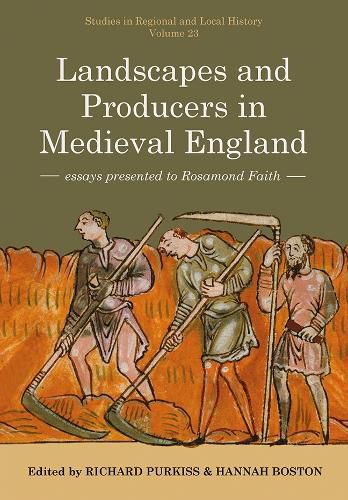Readings Newsletter
Become a Readings Member to make your shopping experience even easier.
Sign in or sign up for free!
You’re not far away from qualifying for FREE standard shipping within Australia
You’ve qualified for FREE standard shipping within Australia
The cart is loading…






Dr Rosamond Faith is a leading historian of the English peasantry in the early and central Middle Ages. In a series of influential studies, she has uncovered the basic structures of rural society, revealing how economic organisation, physical environment, and ideology shaped the lives of ordinary people in the earliest documented centuries.
In this Festschrift, friends and colleagues take up her theme, offering new perspectives on people who worked for a living between the seventh and fourteenth centuries. King Alfred famously divided society into three orders, but whereas the lives of 'those who fight' and 'those who pray' are recorded in their own words, the experience of 'those who work' can only be recovered indirectly. The essays collected here approach rural society under three different headings, each examining a different dimension of peasant life.
The first section addresses the organisation of rural society. Every locality was subject to instruments and processes regulating the exploitation of the landscape, whether administrative or co-operative in nature, and whether operating on a regional or manorial scale. A second group of essays considers how the rural population was classified, and how this reflected or obscured realities on the ground. Administrative documents employed social categories which did not necessarily align with everyday usage, while people whose livelihood was not wholly agricultural, or not entirely encompassed by the manor, had a light documentary footprint. Further papers address the practicalities of agricultural production. While much was dictated by universal constraints, scientific and topographical studies shed light on adaptations in technology and cultivation systems.
The expert contributions assembled in this lively volume include local studies ranging from Devon to Lincolnshire and will be of interest to anyone thinking about the social history of medieval England.
$9.00 standard shipping within Australia
FREE standard shipping within Australia for orders over $100.00
Express & International shipping calculated at checkout
Stock availability can be subject to change without notice. We recommend calling the shop or contacting our online team to check availability of low stock items. Please see our Shopping Online page for more details.
Dr Rosamond Faith is a leading historian of the English peasantry in the early and central Middle Ages. In a series of influential studies, she has uncovered the basic structures of rural society, revealing how economic organisation, physical environment, and ideology shaped the lives of ordinary people in the earliest documented centuries.
In this Festschrift, friends and colleagues take up her theme, offering new perspectives on people who worked for a living between the seventh and fourteenth centuries. King Alfred famously divided society into three orders, but whereas the lives of 'those who fight' and 'those who pray' are recorded in their own words, the experience of 'those who work' can only be recovered indirectly. The essays collected here approach rural society under three different headings, each examining a different dimension of peasant life.
The first section addresses the organisation of rural society. Every locality was subject to instruments and processes regulating the exploitation of the landscape, whether administrative or co-operative in nature, and whether operating on a regional or manorial scale. A second group of essays considers how the rural population was classified, and how this reflected or obscured realities on the ground. Administrative documents employed social categories which did not necessarily align with everyday usage, while people whose livelihood was not wholly agricultural, or not entirely encompassed by the manor, had a light documentary footprint. Further papers address the practicalities of agricultural production. While much was dictated by universal constraints, scientific and topographical studies shed light on adaptations in technology and cultivation systems.
The expert contributions assembled in this lively volume include local studies ranging from Devon to Lincolnshire and will be of interest to anyone thinking about the social history of medieval England.